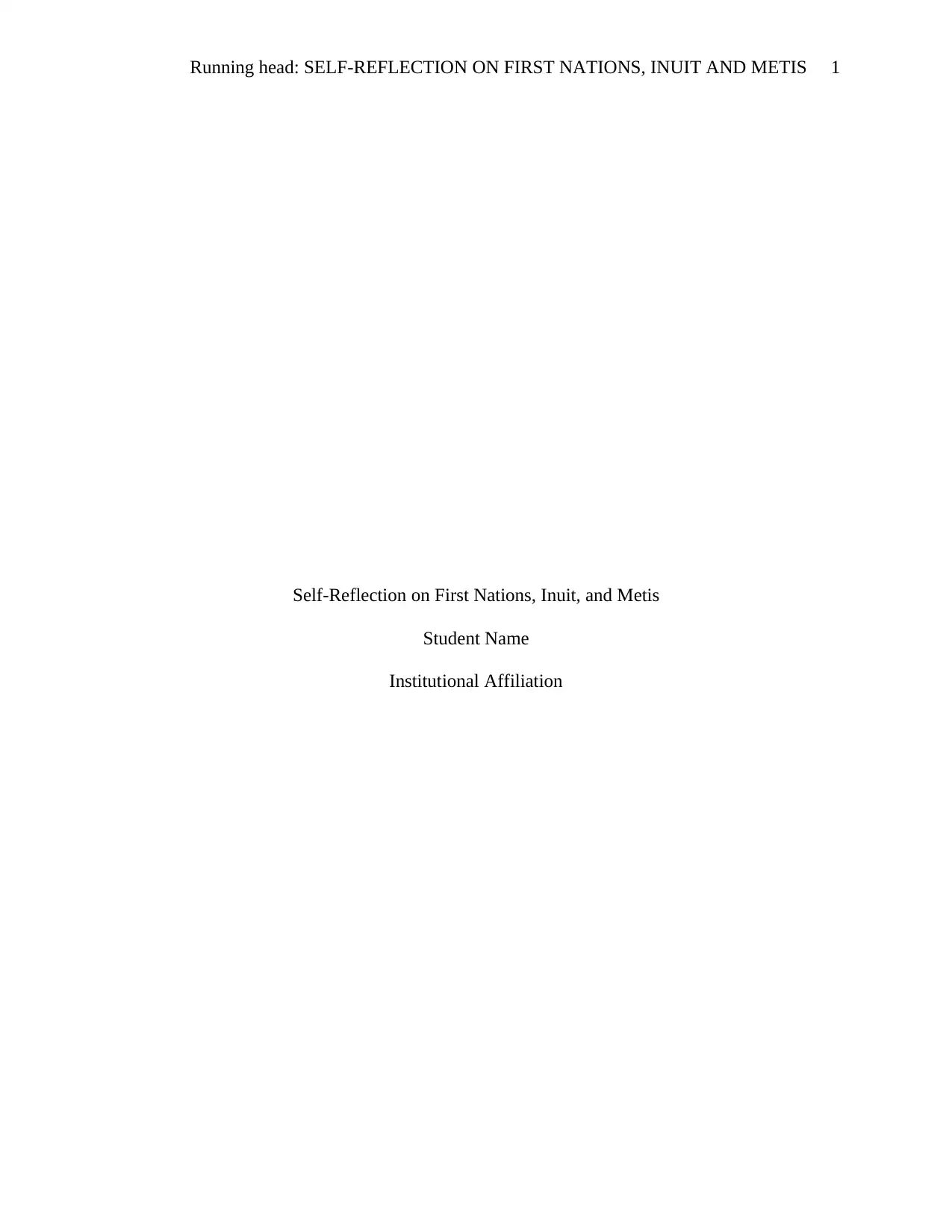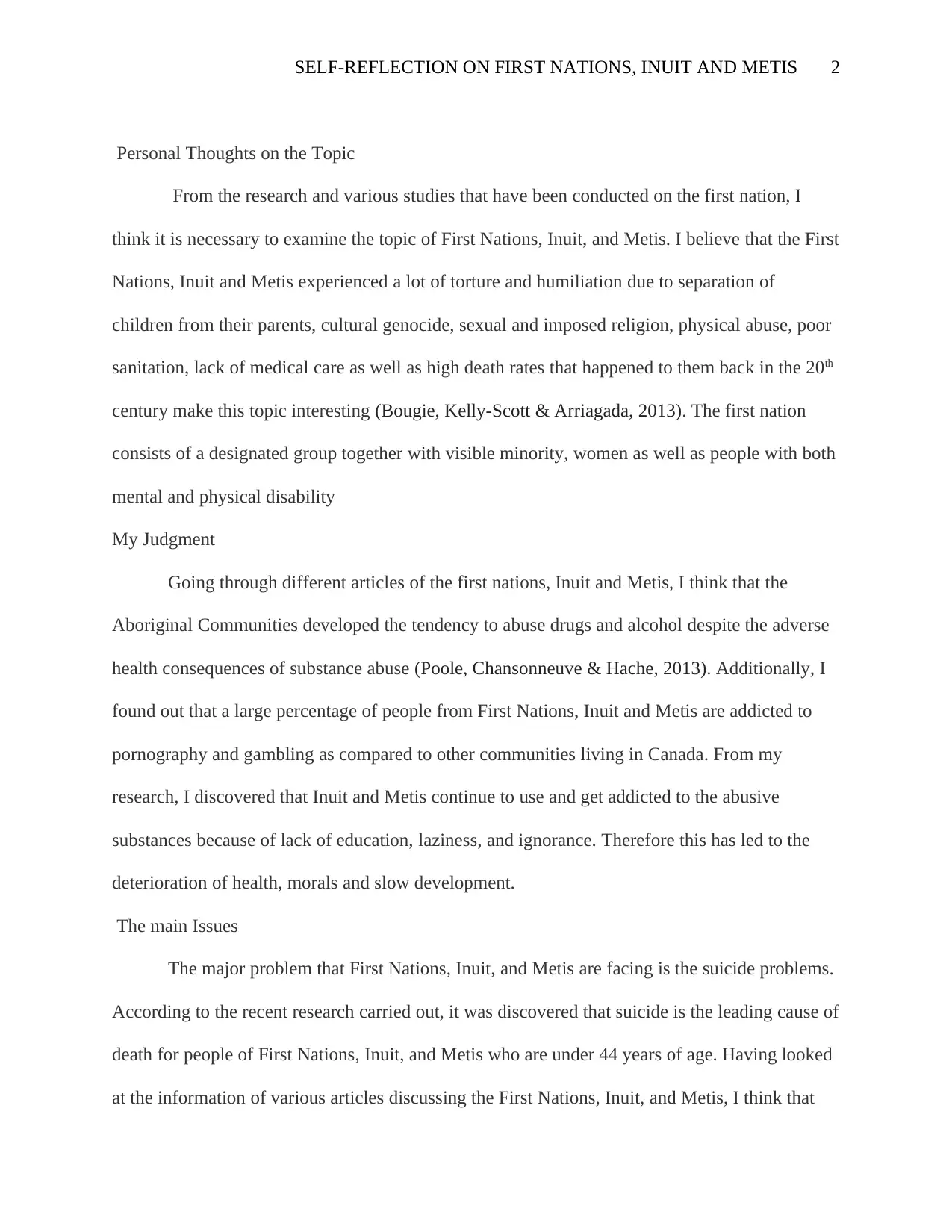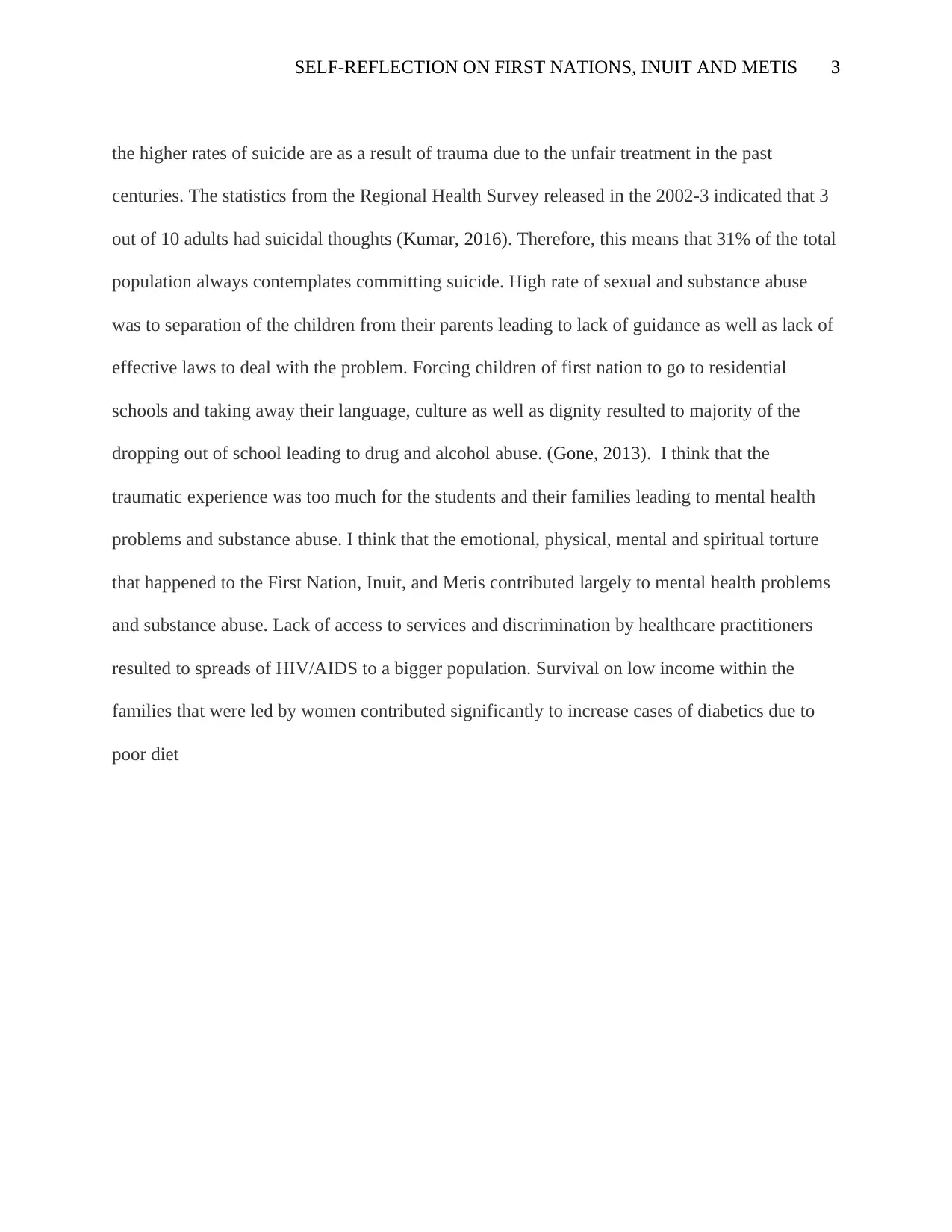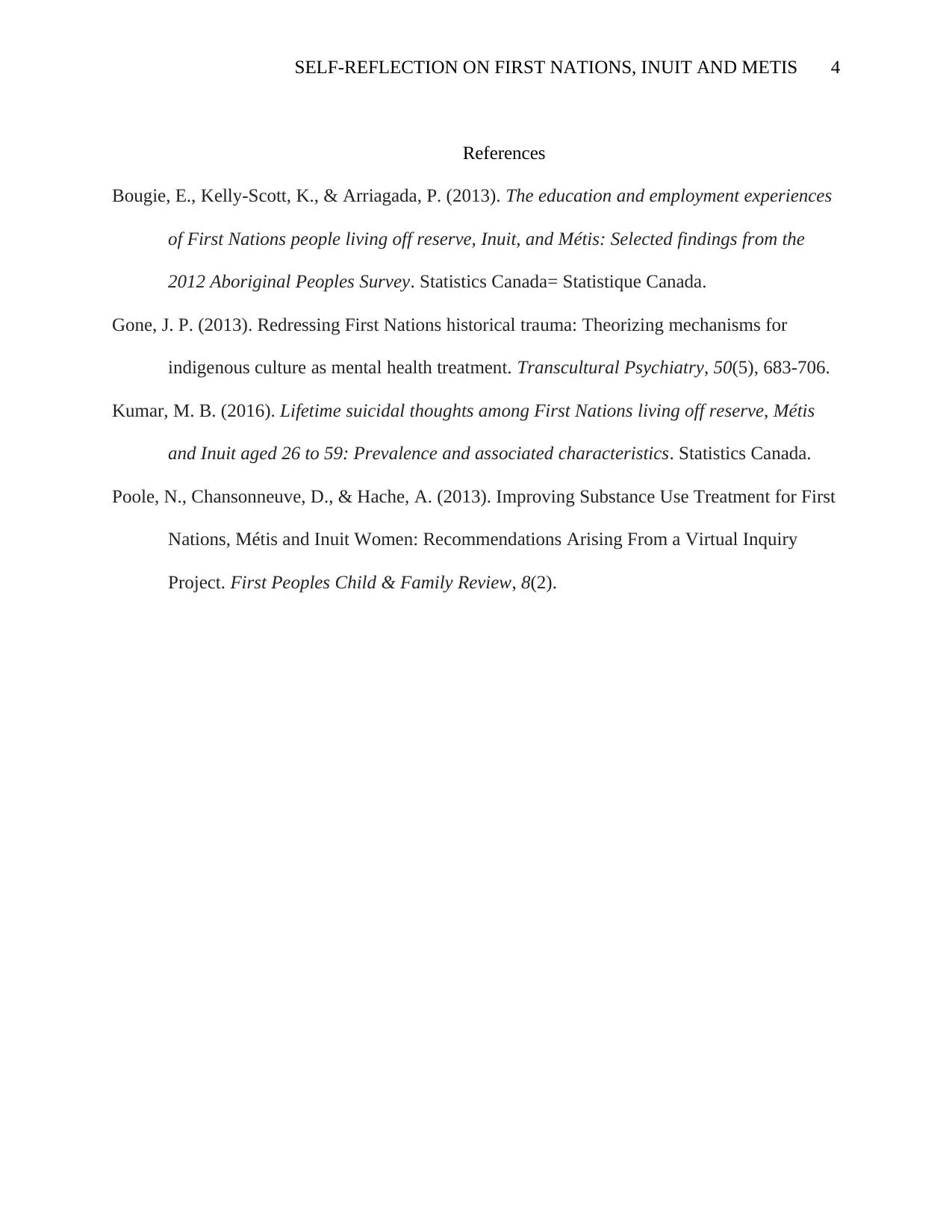Reflecting on Historical and Contemporary Issues: First Nations
VerifiedAdded on 2023/06/10
|4
|802
|60
Essay
AI Summary
This essay presents a self-reflection on the issues faced by First Nations, Inuit, and Metis peoples, drawing from research and studies to highlight historical and contemporary challenges. It discusses the impacts of cultural genocide, the separation of children from their families, and the prevalence of substance abuse and mental health issues within these communities. The reflection acknowledges the high suicide rates among young Indigenous people, attributing it to historical trauma and lack of access to services. The essay also touches on the links between historical injustices, current social problems, and health disparities, such as the spread of HIV/AIDS and diabetes, emphasizing the need for understanding and addressing these complex issues.

Running head: SELF-REFLECTION ON FIRST NATIONS, INUIT AND METIS 1
Self-Reflection on First Nations, Inuit, and Metis
Student Name
Institutional Affiliation
Self-Reflection on First Nations, Inuit, and Metis
Student Name
Institutional Affiliation
Paraphrase This Document
Need a fresh take? Get an instant paraphrase of this document with our AI Paraphraser

SELF-REFLECTION ON FIRST NATIONS, INUIT AND METIS 2
Personal Thoughts on the Topic
From the research and various studies that have been conducted on the first nation, I
think it is necessary to examine the topic of First Nations, Inuit, and Metis. I believe that the First
Nations, Inuit and Metis experienced a lot of torture and humiliation due to separation of
children from their parents, cultural genocide, sexual and imposed religion, physical abuse, poor
sanitation, lack of medical care as well as high death rates that happened to them back in the 20th
century make this topic interesting (Bougie, Kelly-Scott & Arriagada, 2013). The first nation
consists of a designated group together with visible minority, women as well as people with both
mental and physical disability
My Judgment
Going through different articles of the first nations, Inuit and Metis, I think that the
Aboriginal Communities developed the tendency to abuse drugs and alcohol despite the adverse
health consequences of substance abuse (Poole, Chansonneuve & Hache, 2013). Additionally, I
found out that a large percentage of people from First Nations, Inuit and Metis are addicted to
pornography and gambling as compared to other communities living in Canada. From my
research, I discovered that Inuit and Metis continue to use and get addicted to the abusive
substances because of lack of education, laziness, and ignorance. Therefore this has led to the
deterioration of health, morals and slow development.
The main Issues
The major problem that First Nations, Inuit, and Metis are facing is the suicide problems.
According to the recent research carried out, it was discovered that suicide is the leading cause of
death for people of First Nations, Inuit, and Metis who are under 44 years of age. Having looked
at the information of various articles discussing the First Nations, Inuit, and Metis, I think that
Personal Thoughts on the Topic
From the research and various studies that have been conducted on the first nation, I
think it is necessary to examine the topic of First Nations, Inuit, and Metis. I believe that the First
Nations, Inuit and Metis experienced a lot of torture and humiliation due to separation of
children from their parents, cultural genocide, sexual and imposed religion, physical abuse, poor
sanitation, lack of medical care as well as high death rates that happened to them back in the 20th
century make this topic interesting (Bougie, Kelly-Scott & Arriagada, 2013). The first nation
consists of a designated group together with visible minority, women as well as people with both
mental and physical disability
My Judgment
Going through different articles of the first nations, Inuit and Metis, I think that the
Aboriginal Communities developed the tendency to abuse drugs and alcohol despite the adverse
health consequences of substance abuse (Poole, Chansonneuve & Hache, 2013). Additionally, I
found out that a large percentage of people from First Nations, Inuit and Metis are addicted to
pornography and gambling as compared to other communities living in Canada. From my
research, I discovered that Inuit and Metis continue to use and get addicted to the abusive
substances because of lack of education, laziness, and ignorance. Therefore this has led to the
deterioration of health, morals and slow development.
The main Issues
The major problem that First Nations, Inuit, and Metis are facing is the suicide problems.
According to the recent research carried out, it was discovered that suicide is the leading cause of
death for people of First Nations, Inuit, and Metis who are under 44 years of age. Having looked
at the information of various articles discussing the First Nations, Inuit, and Metis, I think that

SELF-REFLECTION ON FIRST NATIONS, INUIT AND METIS 3
the higher rates of suicide are as a result of trauma due to the unfair treatment in the past
centuries. The statistics from the Regional Health Survey released in the 2002-3 indicated that 3
out of 10 adults had suicidal thoughts (Kumar, 2016). Therefore, this means that 31% of the total
population always contemplates committing suicide. High rate of sexual and substance abuse
was to separation of the children from their parents leading to lack of guidance as well as lack of
effective laws to deal with the problem. Forcing children of first nation to go to residential
schools and taking away their language, culture as well as dignity resulted to majority of the
dropping out of school leading to drug and alcohol abuse. (Gone, 2013). I think that the
traumatic experience was too much for the students and their families leading to mental health
problems and substance abuse. I think that the emotional, physical, mental and spiritual torture
that happened to the First Nation, Inuit, and Metis contributed largely to mental health problems
and substance abuse. Lack of access to services and discrimination by healthcare practitioners
resulted to spreads of HIV/AIDS to a bigger population. Survival on low income within the
families that were led by women contributed significantly to increase cases of diabetics due to
poor diet
the higher rates of suicide are as a result of trauma due to the unfair treatment in the past
centuries. The statistics from the Regional Health Survey released in the 2002-3 indicated that 3
out of 10 adults had suicidal thoughts (Kumar, 2016). Therefore, this means that 31% of the total
population always contemplates committing suicide. High rate of sexual and substance abuse
was to separation of the children from their parents leading to lack of guidance as well as lack of
effective laws to deal with the problem. Forcing children of first nation to go to residential
schools and taking away their language, culture as well as dignity resulted to majority of the
dropping out of school leading to drug and alcohol abuse. (Gone, 2013). I think that the
traumatic experience was too much for the students and their families leading to mental health
problems and substance abuse. I think that the emotional, physical, mental and spiritual torture
that happened to the First Nation, Inuit, and Metis contributed largely to mental health problems
and substance abuse. Lack of access to services and discrimination by healthcare practitioners
resulted to spreads of HIV/AIDS to a bigger population. Survival on low income within the
families that were led by women contributed significantly to increase cases of diabetics due to
poor diet
⊘ This is a preview!⊘
Do you want full access?
Subscribe today to unlock all pages.

Trusted by 1+ million students worldwide

SELF-REFLECTION ON FIRST NATIONS, INUIT AND METIS 4
References
Bougie, E., Kelly-Scott, K., & Arriagada, P. (2013). The education and employment experiences
of First Nations people living off reserve, Inuit, and Métis: Selected findings from the
2012 Aboriginal Peoples Survey. Statistics Canada= Statistique Canada.
Gone, J. P. (2013). Redressing First Nations historical trauma: Theorizing mechanisms for
indigenous culture as mental health treatment. Transcultural Psychiatry, 50(5), 683-706.
Kumar, M. B. (2016). Lifetime suicidal thoughts among First Nations living off reserve, Métis
and Inuit aged 26 to 59: Prevalence and associated characteristics. Statistics Canada.
Poole, N., Chansonneuve, D., & Hache, A. (2013). Improving Substance Use Treatment for First
Nations, Métis and Inuit Women: Recommendations Arising From a Virtual Inquiry
Project. First Peoples Child & Family Review, 8(2).
References
Bougie, E., Kelly-Scott, K., & Arriagada, P. (2013). The education and employment experiences
of First Nations people living off reserve, Inuit, and Métis: Selected findings from the
2012 Aboriginal Peoples Survey. Statistics Canada= Statistique Canada.
Gone, J. P. (2013). Redressing First Nations historical trauma: Theorizing mechanisms for
indigenous culture as mental health treatment. Transcultural Psychiatry, 50(5), 683-706.
Kumar, M. B. (2016). Lifetime suicidal thoughts among First Nations living off reserve, Métis
and Inuit aged 26 to 59: Prevalence and associated characteristics. Statistics Canada.
Poole, N., Chansonneuve, D., & Hache, A. (2013). Improving Substance Use Treatment for First
Nations, Métis and Inuit Women: Recommendations Arising From a Virtual Inquiry
Project. First Peoples Child & Family Review, 8(2).
1 out of 4
Related Documents
Your All-in-One AI-Powered Toolkit for Academic Success.
+13062052269
info@desklib.com
Available 24*7 on WhatsApp / Email
![[object Object]](/_next/static/media/star-bottom.7253800d.svg)
Unlock your academic potential
Copyright © 2020–2026 A2Z Services. All Rights Reserved. Developed and managed by ZUCOL.





